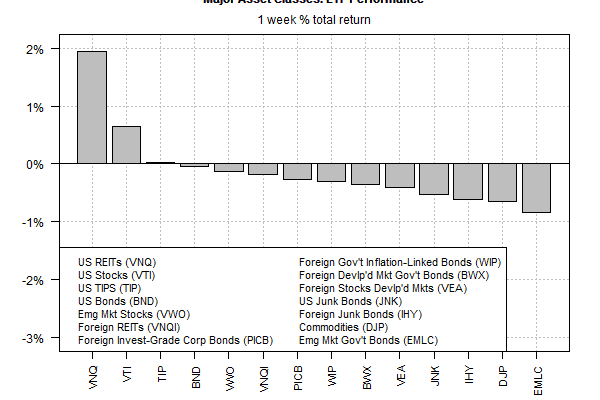Real estate investment trusts (REITs) in the US-led markets higher last week for the major asset classes, based on a set of exchange-traded products. The latest gain marks the second straight week that US REITs delivered the strongest performance.
Vanguard REIT (VNQ) gained 1.9% for the holiday-shortened four-day US trading week through Friday, June 1 — an outsized gain vs. the other major asset classes. The latest pop lifted VNQ to its highest weekly close since January.
Rising interest rates took a toll on the yield-sensitive REIT sector in this year’s first quarter, but in Q2 the crowd appears to be rethinking the prospects for property stocks.
“If interest rates are going up because the economy is improving, that can be positive for REITs because landlords can raise rents to cover the rate increases,â€Â advised Brian Cordes, a senior vice president at Cohen & Steers, an investment firm that specializes in real estate. In an interview with CNBC last week he predicted that the US economy will grow 2.9% in 2018 and so “we see the recent pullback [in REITs] as an attractive entry point to the asset class.â€
Meanwhile, bonds in emerging market suffered the biggest setback last week among the major asset classes. VanEck Vectors JP Morgan Emerging Markets Local Current Bond (EMLC) slumped 0.8%. The latest weekly dip left the ETF near its lowest close in more than a year.
A strengthening US dollar is widely cited as a key factor in the recent headwinds for emerging markets assets generally. “The dollar remains the single most important consideration for EM [emerging-markets] finances,†according to a report from Fitch, a debt-ratings consultancy, via The Wall Street Journal. Recent history certainly highlights this factor: the US Dollar Index is up almost 5% for the past two months vs. a nearly 9% slump in EMLC over that period.

For the one-year trend, US equities continue to hold the top spot for performances among the major asset classes. Vanguard Total Stock Market (VTI) is up a solid 15.3% over the past 12 months after factoring in payouts.

